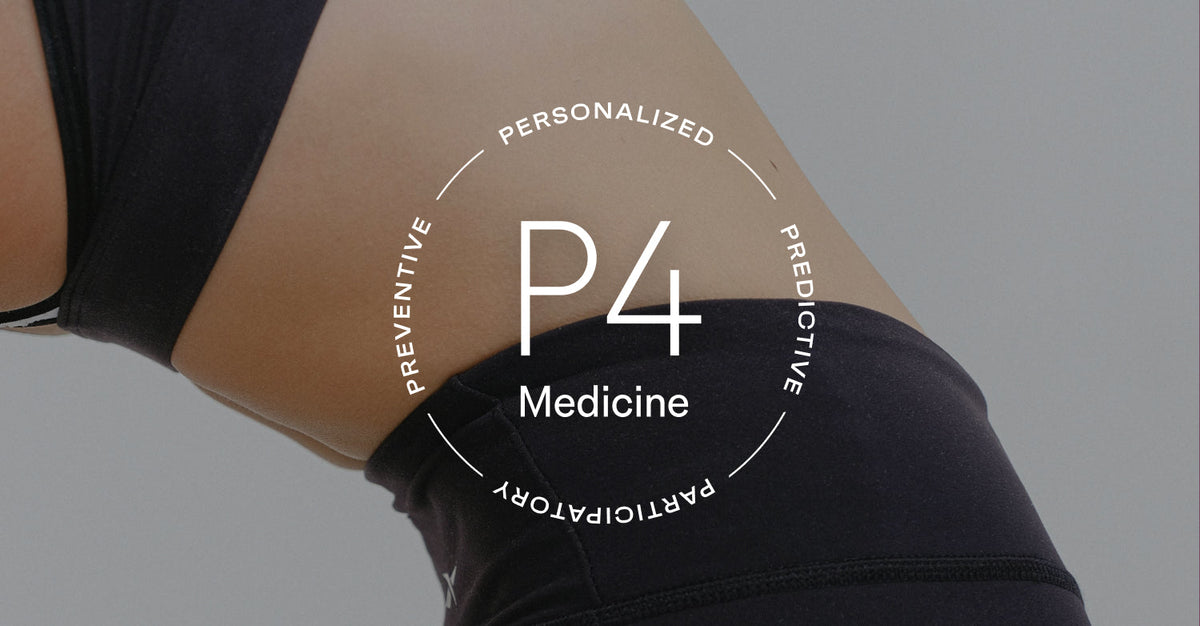

Modern health care systems are undergoing a transformation. For decades, medical practice has largely been reactive—treating disease once symptoms appear. This “one-size-fits-all” model often struggles with chronic diseases, which can account for enormous healthcare costs and declining patient outcomes.
In response, researchers and clinicians are turning toward P4 medicine: a model of care that is personalized, predictive, preventive, and participatory. By combining insights from systems biology, genomic medicine, and scientific wellness, P4 medicine seeks to identify risk factors early, predict disease progression, and personalize treatment and lifestyle changes—long before serious illness develops.
At Tally Health, our membership was founded with this purpose: to provide individuals the opportunity to discover, understand, and optimize their biology through cutting-edge science.
What Is P4 Medicine?

P4 medicine was introduced as a vision of the future of health, focusing on the unique health status of each individual patient. Unlike conventional evidence-based medicine, which often treats the general population as a whole, P4 medicine applies systems medicine and precision medicine approaches to maximize health outcomes.
The four pillars of P4 medicine are:
Predictive – Using genetic data, genome sequencing, and biomarker discovery to predict diseases before symptoms occur.
Preventive – Employing preventive medicine and cost-effective strategies to reduce disease risk and prevent serious diseases like cancer or cardiovascular conditions.
Personalized – Tailoring care based on genetic and phenotypic characteristics, medical history, and lifestyle data for truly personalized medicine.
Participatory – Engaging patients as active partners in their physical health and mental health, empowering them to make lifestyle changes and manage chronic disease risk.
How P4 Medicine Improves Patient Care

1. Early Diagnosis and Risk Assessment
By integrating genetic testing, blood tests, and health data, P4 medicine enables more accurate risk assessment for human diseases such as breast cancer and lung cancer. This early warning system allows for population screening, better prevention, and faster early diagnosis.
2. Personalized Medicine and Targeted Therapies
Instead of generic treatment, P4 medicine applies targeted therapies that align with a patient’s genetic variants and biological systems. For example, advances in cancer biology and drug development are helping oncologists deliver cancer medicine tailored to an individual’s tumor profile.
3. Preventive Medicine and Lifestyle Changes
Predictive insights make it possible to design cost effective strategies that encourage lifestyle changes to prevent chronic disease. From nutrition to exercise, these interventions optimize both physical health and mental health, reducing the burden on healthcare institutions.
4. Patient Participation and Engagement
In the P4 framework, patients aren’t passive. Instead, health care providers collaborate with patients, ensuring they are informed participants. This participatory model promotes better adherence to care plans and improves patient outcomes across complex diseases.
The Role of Systems Biology and Big Data

A hallmark of P4 medicine is its reliance on systems biology and big data. By analyzing data obtained from biological samples, clinical biochemistry, biomedical research, and even artificial intelligence, clinicians can generate a holistic view of disease progression. These dynamic network states reveal how biological systems change over time, giving rise to more precise interventions.
This shift toward systems medicine not only enhances patient care but also helps the healthcare sector design cost effective strategies for the general population while still focusing on individual patient needs.
Challenges and Considerations

While the vision of P4 medicine is compelling, challenges remain. Obtaining data raises questions around privacy, especially under laws like the Genetic Information Nondiscrimination Act (GINA). Integrating massive amounts of genetic data and lifestyle data is technically challenging and also requires cooperation across the healthcare industry, healthcare providers, and wellness industry.
Additionally, high-quality randomized clinical trials, systematic reviews, and clinical studies are ultimately needed to validate new approaches and ensure improved health outcomes without unintended adverse events.
Why P4 Medicine Matters

P4 medicine represents a major step toward scientific wellness, offering the chance to transform healthcare systems from reactive disease management to proactive wellness care. The result is:
Better health outcomes through early diagnosis and risk assessment.
Reduced healthcare costs by focusing on prevention.
Enhanced patient outcomes through personalized medicine and targeted therapies.
Greater engagement of individuals in their own health journey.
By combining the best of genomic medicine, systems biology, and personalized medicine, P4 medicine is setting the stage for a more cost effective, humane, and effective healthcare sector.
Final Thoughts

The future of medical practice lies in shifting from reactive to proactive care. P4 medicine—personalized, predictive, preventive, and participatory—has the power to transform how we approach chronic disease, cancer medicine, and overall public health.
For health care providers, adopting this model means empowering patients, leveraging genetic and lifestyle data, and applying precision medicine tools to ensure the best possible health outcomes. For patients, it means taking part in your own care to extend healthspan and reduce the risk of serious diseases.
The healthcare landscape is changing. P4 medicine is not just a concept—it’s the path toward improved health outcomes and a longer, healthier life.
Take Your Health Further with Tally Health Membership

Put personalized insights into practice with the Tally Health membership. Your longevity gameplan to healthier, more vibrant years. Your Tally Health membership includes:
Biannual epigenetic testing to track your epigenetic age over time.
Targeted pro-longevity supplements designed to support healthy aging through support for energy, sleep, cognitive health and immunity.
Personalized action plans based on your unique epigenetics, giving you step-by-step guidance to improve your healthspan.
Tally Health membership empowers you to put P4 medicine into practice in your daily life, helping you move from reactive care to proactive, personalized wellness. By enrolling, you can discover, understand, and optimize your health like never before—maximizing both lifespan and quality of life.
What are the four pillars of P4 medicine?
The four pillars of P4 medicine are Predictive, Preventive, Personalized, and Participatory.
How does P4 medicine improve patient care?
P4 medicine improves patient care through early diagnosis and risk assessment, personalized medicine and targeted therapies, preventive medicine and lifestyle changes, and patient participation and engagement.
Why does P4 medicine matter?
P4 medicine matters because it transforms healthcare from reactive disease management to proactive wellness care, leading to better health outcomes, reduced healthcare costs, personalized treatments, and greater patient engagement.
Recommended Supplements
References
Hood and Price. The Age of Scientific Wellness: Why the Future of Medicine Is Personalized, Predictive, Data-Rich, and in Your Hands. Belknap Press: An Imprint of Harvard University Press 2023.
Hood and Flores. A personal view on systems medicine and the emergence of proactive P4 medicine: predictive, preventive, personalized and participatory. N Biotechnol 2012; https://doi.org/10.1016/j.nbt.2012.03.004
Hood et al. Revolutionizing medicine in the 21st century through systems approaches. Biotechnol J 2012; https://doi.org/10.1002/biot.201100306
Hood et al. Integrating big data and actionable health coaching to optimize wellness. BMC Med 2015; https://doi.org/10.1186/s12916-014-0238-7
Sobradillo et al. P4 medicine: the future around the corner. Arch Bronconeumol 2011; https://doi.org/10.1016/j.arbres.2010.09.009
Price et al. A wellness study of 108 individuals using personal, dense, dynamic data clouds. Nat Biotechol 2017; https://doi.org/10.1038/nbt.3870











